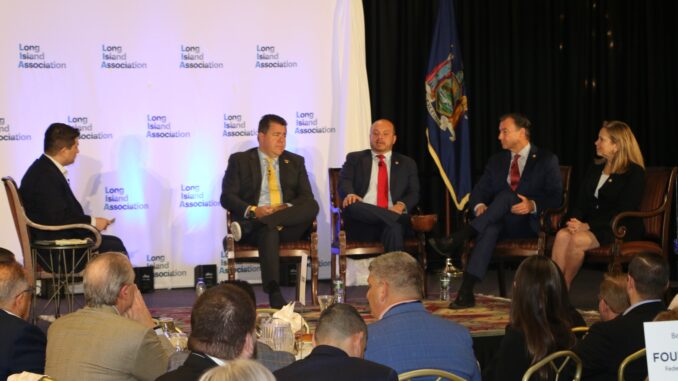
By Hank Russell
With the presence of two Republican and two Democrat members of Congress from Long Island in the same room, one would think that there would be fireworks, but, in fact, it was just the opposite.
During the Long Island Association’s (LIA) “What’s New in Washington” event at the Crest Hollow Country Club in Woodbury on March 28, Nick LaLota (R-Rocky Point), Andrew Garbarino (R-Patchogue), Tom Suozi (D-Glen Cove) and Laura Gillen (D-Garden City) spoke about bipartisanship. They also covered other topics such as the SALT (State And Local Taxes) deduction cap, Elon Musk’s actions at DOGE (Department of Government Efficiency), green energy and housing.
As an example of how they work together, Suozzi pointed out that he, LaLota and Garbarino are part of the Problem Solvers Caucus, in which Suozzi is the co-chair. Garbarino cited the three others for supporting his bill that would provide $1 billion in funding over the next 10 years to modernize the Merchant Marine Academy.
“We need it and our country needs it,” he said.
“It’s all about reaching across the aisle,” LaLota added.
One of the issues that all four were united on was raising the cap on the $10,000 SALT deduction. Suozzi pointed out that LaLota and Garbarino stood up to members of their own party on that issue. “They should be applauded for that,” Suozzi said.
Garbarino said President Donald Trump was one of the biggest supporters of raising the cap. When he visited the president at his Mar-A-Lago residence in Florida, “Every meeting, he kept bringing it up,” Garbarino said. “Even when we didn’t meet on it, he still kept bringing it up.”
“They say SALT is for the elites,” Gillen said of the detractors, adding she co-sponsored the bill that would lift the cap. “That is how bipartisanship works.”
But some in Congress were not on board with the deduction. “Some say it’s a largesse for the federal government,” LaLota said. “Others say it’s a tax cut for billionaires.” He said he would like to lift the cap, but that’s “not in the cards” and instead settled for raising the cap.
The next issue focused on wind power. LaLota and Gillen noted that some of the projects were being built, or proposed to be built, in areas where the communities did not want them there. “You see projects … where they’re not [performing] community outreach,” Gillen said.
LaLota said he made sure that one wind project in his district would not go up. He said, before any wind project begins, “We have to make sure that we have a neutral observer measure what the environmental impact is and put it where it’s needed,” he said. “That way, it’s good for jobs and it’s good for the economy.”
The only topic the four seemed to disagree on was DOGE’s handling of its government cuts. Suozzi called the cuts “reckless” and would negatively impact local medical and science centers such as Cold Spring Harbor Laboratory and the Feinstein Institute. He said DOGE took a “wrecking ball approach” to Medicaid. According to Suozzi, all those cuts to Medicaid added up to only less than a 1% reduction in the budget.
LaLota said that these cuts are needed to achieve a balanced budget. He also disagreed with Suozizi’s assessment of DOGE’s approach; as an example, he urged Trump not to cut funding to the World Trade Center Health Program. “We said [to Trump], ‘Please reverse [the cuts], and he listened,” LaLota said.
The topic shifted to the economy, specifically tariffs. LaLota said he supported the tariffs because they “create a better fairness for manufacturers and [the] agriculture [industry].” He said it will be “a long-term change, but it will help reduce the trade deficit.”
Suozzi agreed that tariffs should be placed on China, but only targeted tariffs. He said he was “concerned” about the tariffs being slapped on Mexico and Canada, saying, “It sends a very bad message.”
Suozzi touched upon the lack of affordability on Long Island. “If someone is making $20 an hour, that comes out to about $40,000 a year,” he said. “There’s no way they can afford it. … The people are so pissed off right now and that’s why Trump got elected.”
LaLota said taxes such as congestion pricing hurt employees and small businesses alike. “If you drive to Manhattan, you shouldn’t have to pay [over $200 a month] just to schlep to your job.”
When asked what is the biggest asset on Long Island, Garbarino motioned to himself and the three other elected officials and replied, “These are the four assets here with backbones that will stand up and say, ‘This is what I need for my district.’ … I don’t see anyone [else in Congress] stepping up [for their districts].”

